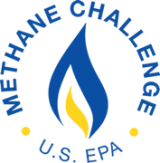Sector-based EPA Methane Partnership Programs
On this page:
- EPA's Domestic Partnership Programs
- Agriculture – AgSTAR Program
- Coal Mining – Coalbed Methane Outreach Program (CMOP)
- Landfills – Landfill Methane Outreach Program (LMOP)
- Oil and Gas – Methane Challenge Program and Natural Gas STAR
EPA's Domestic Partnership Programs
U.S. industries—along with state and local governments—have been working collaboratively with EPA to implement several voluntary programs that promote profitable opportunities for reducing methane emissions. These programs are designed to overcome a wide range of informational, technical, and institutional barriers to reducing U.S. methane emissions, while creating profitable activities for the agriculture, coal mining, landfill, and oil & gas industries. As part of its efforts under the GMI, EPA is exporting the expertise and experience gained through these successful voluntary programs to advance methane recovery and utilization around the world.

Agriculture

The AgSTAR Program is a voluntary effort jointly sponsored by EPA, the U.S. Department of Agriculture, and the U.S. Department of Energy. AgSTAR promotes the use of biogas recovery systems to reduce methane emissions from livestock waste. In addition to producing biogas, anaerobic digestion systems can also help achieve other social, environmental, agricultural and economic benefits.
- Visit the Biogas Toolkit – Centralized knowledge hub for biogas project stakeholders
- Learn about biogas recovery in the agriculture sector
- Find out about AgSTAR's impact
- AgSTAR Partners
Under the GMI, EPA works with various organizations to promote methane recovery and use opportunities worldwide. For Example, EPA is working with the World Bank in Southeast Asia to provide technical support to a livestock waste management project that integrates policy development and implementation, technological solutions, capacity building, and regional connections. EPA also is working with USAID in Mexico to develop demonstration projects showcasing best practices for the capture and use of methane in large- and small-scale pig farms.
Coal Mining

The Coalbed Methane Outreach Program (CMOP) is an EPA-sponsored voluntary program whose goal is to reduce methane emissions from coal mining activities. By working cooperatively with coal companies and related industries, CMOP helps to identify and implement methods to use coal mine methane (CMM) instead of emitting it to the atmosphere. In turn, these actions mitigate climate change, improve mine safety and productivity, and generate revenues and cost savings. Additionally, by working to maximize the amount of gas recovered from their drainage systems, CMOP projects greatly reduced mine ventilation costs and improved safety conditions for miners.
Under the GMI, EPA works with organizations in many coal-producing countries to promote CMM development and use. EPA characterized global CMM emissions, projects, potential, and obstacles in a comprehensive report, the Coal Mine Methane Country ProfilesExit.
Landfills

The Landfill Methane Outreach Program (LMOP) is a voluntary assistance and partnership program that promotes the use of landfill gas (LFG) as a renewable, green energy source. LFG is the natural by-product of the decomposition of solid waste in landfills and is comprised primarily of carbon dioxide and methane. By preventing methane emissions through the development of landfill gas energy projects, LMOP helps businesses, states, energy providers, and communities protect the environment and build a sustainable future.
- Visit the Biogas Toolkit – Centralized knowledge hub for biogas project stakeholders
- Learn about the benefits of LFG energy
- LMOP accomplishments
- LMOP Partners
Under the GMI, EPA is working with countries and project network members to promote LFG recovery and use by offering a broad spectrum of outreach, education, and technical assistance services. EPA has assessed the technical and economic feasibility of LFG project development at selected landfills in a number of countries around the world.
Oil and Gas
The Natural Gas STAR Program is a flexible, voluntary partnership between EPA and the oil and natural gas industry. Through the Program, EPA works with companies that produce, process, and transmit and distribute natural gas to identify and promote the implementation of cost-effective technologies and practices to reduce methane emissions. Natural Gas STAR industry partners have operations in all of the major industry sectors (production, processing, transmission, and distribution) and represent more than 50% of the natural gas industry in the United States.
EPA officially launched the Natural Gas STAR Methane Challenge Program at the Global Methane Forum on March 30, 2016. The Program provides a new mechanism through which oil and gas companies can make and track ambitious commitments to reduce methane emissions. Methane Challenge Program Partners will transparently report systematic and comprehensive actions to reduce methane emissions and be publicly recognized as leaders in reducing methane emissions in the U.S.


